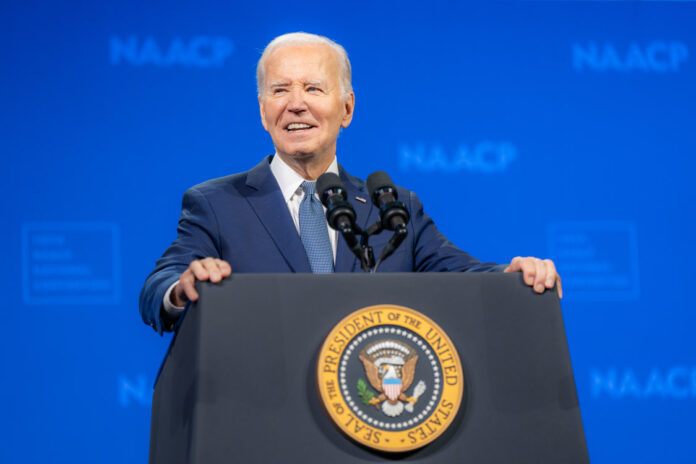In a landmark move, U.S. President Joe Biden has commuted the sentences of nearly 2,500 individuals convicted of non-violent drug offenses, signaling a bold commitment to rectifying longstanding disparities in the American criminal justice system.
“Today, I am commuting the sentences of nearly 2,500 people convicted of nonviolent drug offenses who are serving disproportionately long sentences compared to the sentences they would receive today,” Biden announced in a statement on Friday.
This decision is a significant step forward in addressing the controversial legacy of harsh drug sentencing laws, particularly those that disproportionately affected marginalized communities. It builds on reforms introduced under the Fair Sentencing Act of 2010 and the First Step Act of 2018, both aimed at reducing the sentencing gap between crack and powder cocaine offenses, which had long been criticized for their racial bias.
Righting Historical Wrongs
Biden’s move reflects a shift away from punitive policies of the past that targeted low-level drug offenders with harsh penalties. Many of the affected individuals were sentenced under guidelines that have since been deemed excessive by modern standards.
“Today’s clemency action provides relief for individuals who received lengthy sentences based on discredited distinctions between crack and powder cocaine, as well as outdated sentencing enhancements for drug crimes,” Biden explained.
Crack cocaine offenses, once punishable at rates 100 times harsher than powder cocaine, were particularly devastating to African American communities during the 1980s and 1990s. While reforms have narrowed this disparity, Biden’s action underscores the administration’s acknowledgment that these changes were overdue.
A President’s Legacy on Clemency
Biden, who as a senator in the 1990s supported some of the punitive drug laws that critics say fueled mass incarceration, appears determined to reshape his legacy on criminal justice. “This action is an important step toward righting historical wrongs, correcting sentencing disparities, and providing deserving individuals the opportunity to return to their families and communities,” he said.
The President also emphasized the need to break the cycle of incarceration for non-violent drug offenders, stating that such individuals have spent “far too much time behind bars” due to outdated legal practices.
Implications of the Commutations
Criminal justice advocates have praised Biden’s decision as a victory for fairness, with many seeing it as a continuation of bipartisan reform efforts. Nkechi Taifa, a U.S.-based justice reform advocate, hailed the commutations as “life-changing for thousands of families who have waited decades for justice.”
However, critics of the administration argue that the decision does not go far enough in addressing systemic issues. Some have called for more comprehensive legislative action to prevent such disparities from reoccurring.
Despite the criticism, Biden’s move is likely to have a profound social impact. According to the White House, many of the individuals affected by the commutations have already demonstrated rehabilitation through good behavior and active participation in educational programs while incarcerated.
Reform Efforts Through Policy
Biden’s decision aligns with broader efforts to tackle criminal justice reform in the United States. The Fair Sentencing Act, signed by President Barack Obama in 2010, was the first major step in addressing racial disparities in drug sentencing. It reduced the crack-to-powder cocaine sentencing ratio from 100-to-1 to 18-to-1.
The First Step Act, passed during the Trump administration, allowed individuals convicted under the old guidelines to apply for reduced sentences retroactively. Biden’s commutations effectively extend these reforms to those who were still left behind.
Civil rights groups continue to push for full elimination of the sentencing disparity, which remains at 18-to-1. Biden has expressed support for this change but has faced resistance from some lawmakers.
The Road Ahead
The President’s decision reignites the conversation about broader criminal justice reforms, including sentencing policy, prison conditions, and reentry programs. “It is time that we equalize these sentencing disparities,” Biden noted, reiterating his administration’s goal to create a system that reflects justice, not prejudice.
As the news of these commutations spreads, the focus now shifts to how society reintegrates these individuals. Advocacy groups have called for increased funding for programs that assist former inmates with housing, employment, and mental health services. Without such support, they warn, the path to rebuilding lives remains fraught with challenges.
While some see this as a pivotal moment in Biden’s presidency, others view it as just the beginning of a larger battle to dismantle decades of systemic injustice in U.S. criminal law.
Global Resonance for Nigeria
For a Nigerian audience, Biden’s actions resonate deeply, especially given the ongoing discourse on reforming Nigeria’s judicial and correctional systems. Activists in Nigeria have long decried the overcrowding of prisons with individuals awaiting trial for minor offenses, including possession of small quantities of marijuana. The U.S. example could inspire similar initiatives aimed at decriminalizing certain offenses and reducing prison populations.
Efforts such as the 2019 Nigerian Correctional Service Act, which emphasized non-custodial sentencing, show that reform is possible. However, experts argue that enforcement remains a challenge in Nigeria, where judicial delays and limited resources continue to strain the system.

